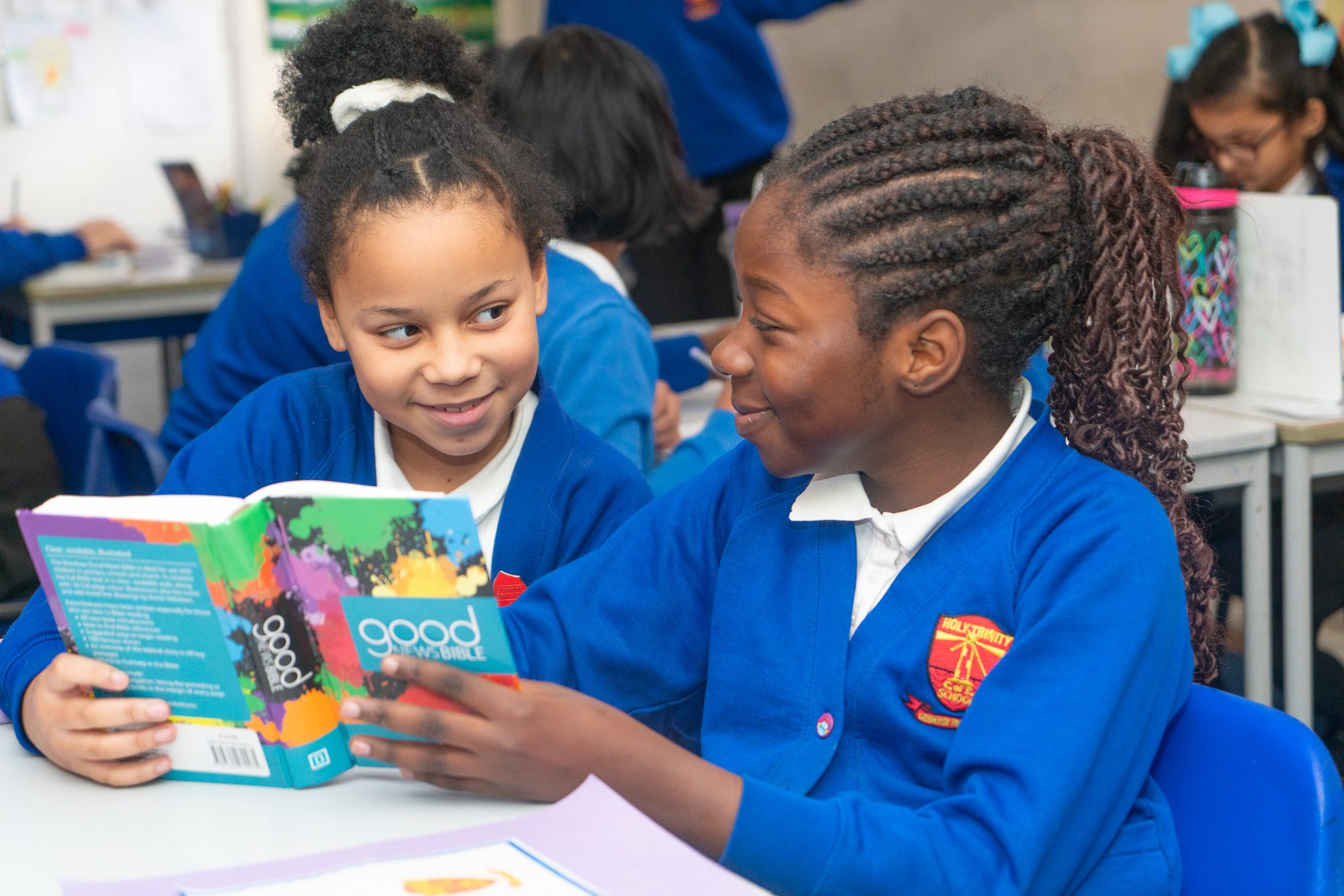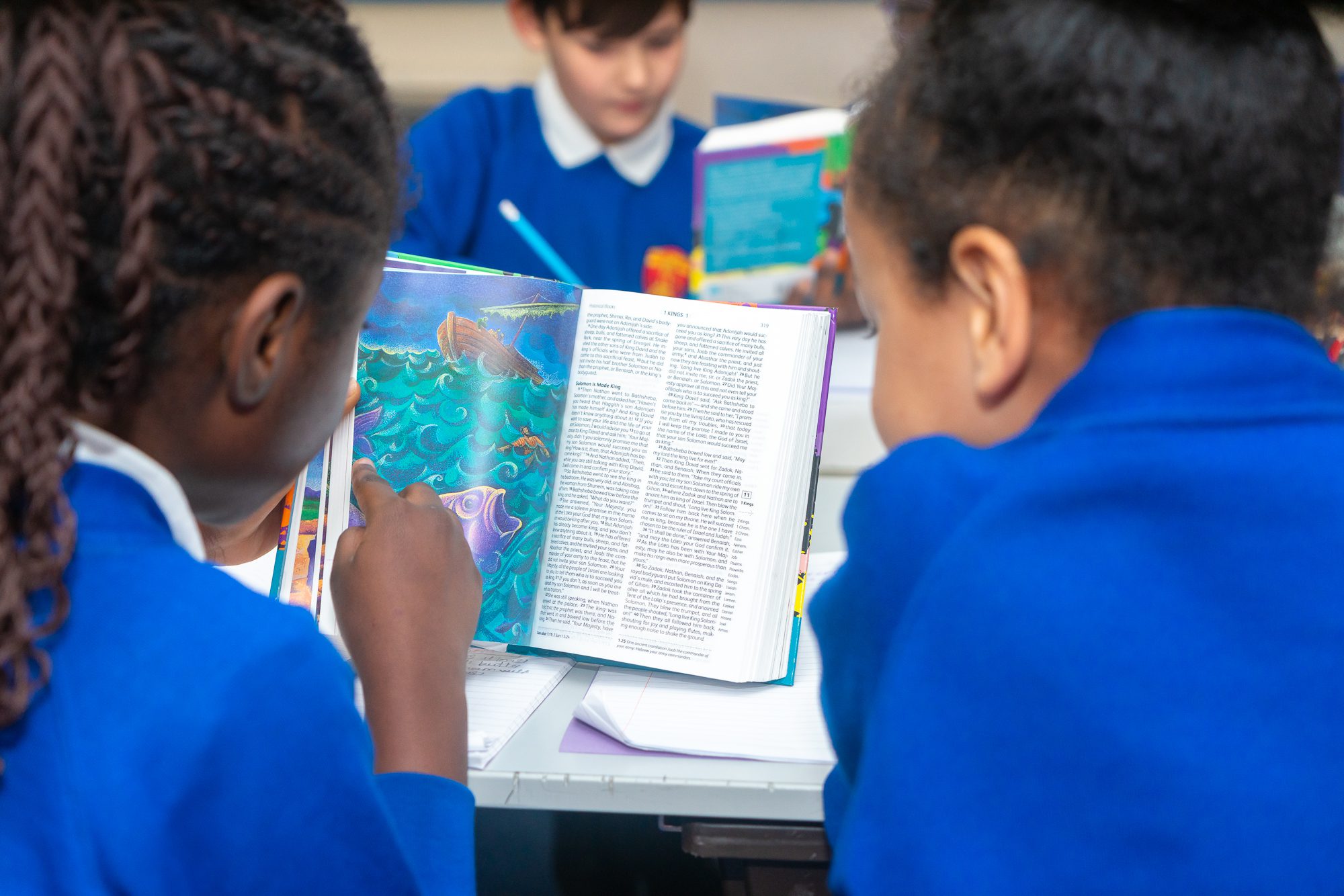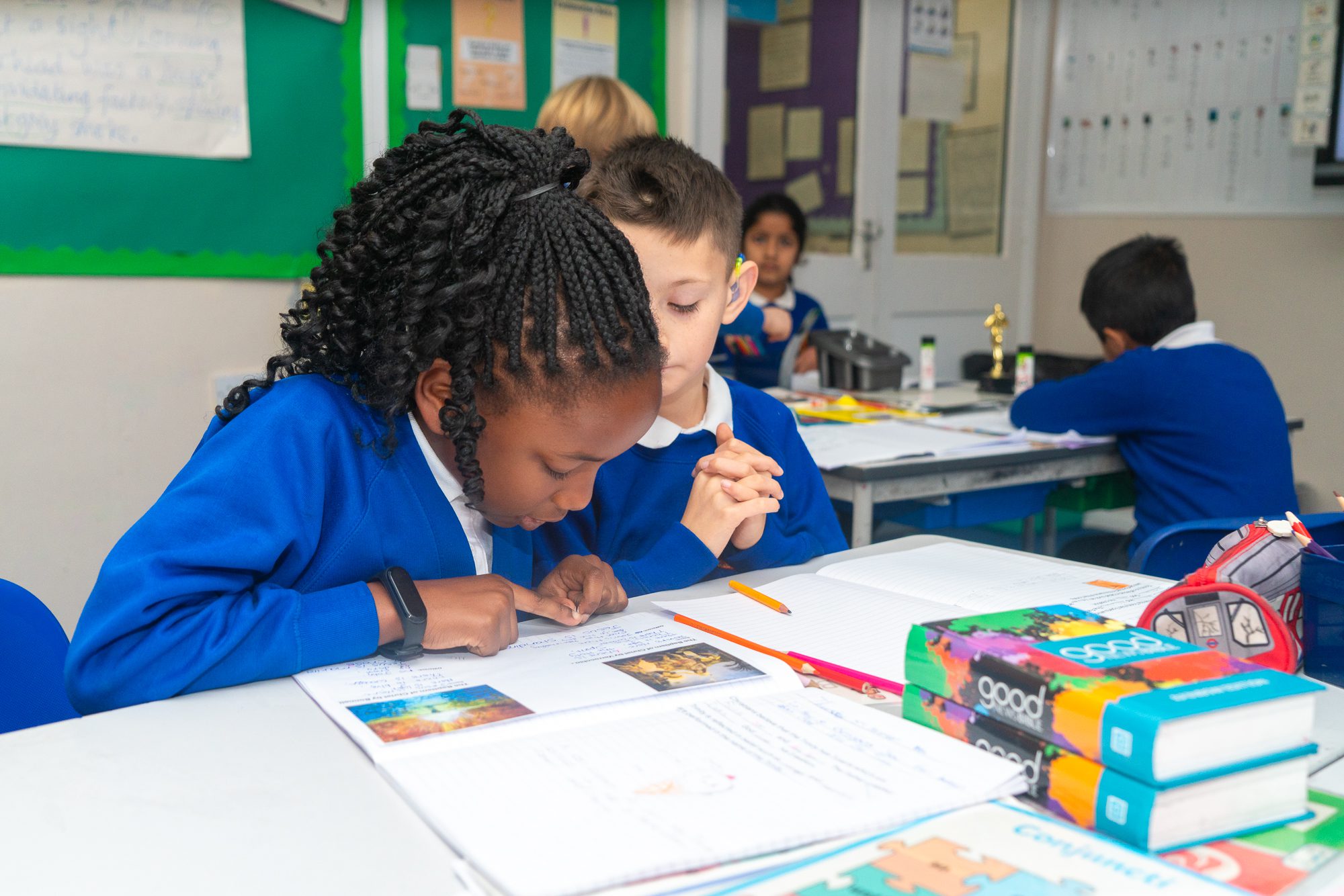Religious Education Subject Leader: Mr M Dockrell
For any more information on Holy Trinity’s Religious Education Curriculum, please contact the office.
As a Church of England Primary school, Christian values permeate everything we do.
Our values of respect, love and honesty guide us daily in our mission to see that all pupils reach their God-given potential. Our RE (Religious Education) lessons are an important part of this work.
The whole school follows the ‘Understanding Christianity’ scheme of work developed by the Church of England.
Intent
Holy Trinity Church of England Primary School is committed to providing a God-centred education for all our pupils. Excellent learning opportunities, that are ambitious, academically robust and socially inclusive, are at the core of our RE provision. Pupils are taught to respect and accept those of all faiths and those of no faith equally.
Our pupils will develop religious literacy across a range of major world faiths, being able to express their thoughts and ideas through discourse with their peers. They will use theological texts as source material, linking these to artworks, music and film, where possible to enrich the learning experience.
The common ‘golden threads’ of all faiths will be explored, with an understanding of how each faith expresses its beliefs. This equips our pupils for living in a diverse and multicultural community: understanding the beliefs of others encourages respect and acceptance.
Pupils will understand and explore how the concepts from different faiths can be exhibited by all, regardless of their faith background. For example: the concepts of love and forgiveness are universal and relevant to all people. Pupils will be given the space to explore how concepts affect their own lives and how they reflect these concepts in their day-to-day activities.
RE allows pupils to explore, and ask, challenging questions. This is actively encouraged in our curriculum, with pupils regularly debating ‘big questions’ such as: ‘Can slavery ever be justified?’ or ‘How can science and religion exist comfortably together?’


Implementation
We teach using the Church of England’s ‘Understanding Christianity’ scheme of work for two–thirds of the academic year. This is centred around a ‘big frieze’ that tells the ‘big story’ of the Bible and pupils often access this artwork at the start of a new unit of work. Each unit of work is linked to one of the ‘big concepts’: God, Creation, People of God, Incarnation, Gospel, Salvation and the Kingdom of God. This concept is identified at the start of a new unit.
By the end of each unit of work, pupils will be able to answer the ‘big question’ that is the unit title. During their studies, pupils examine the theological texts that underpin the concept, explore how Christians’ lives are shaped by this concept and how all people, regardless of faith, can exhibit this concept in their lives.
Pupils access RE learning in a variety of ways: using artworks, role play and artefacts to understand the concept, often using questioning, debate and discussion to deepen their understanding, before responding in writing, drawing, poetry, posters or play scripts amongst a variety of creative outcomes.
Pupils with English as an additional language are given access to Biblical texts in their home language to allow them access to the lessons. Pupils who would benefit from a simplified English version of the Bible are given that opportunity, again, allowing access for all our pupils. Those pupils who are operating above their peer group are able to work from the ‘digging deeper’ parts of ‘Understanding Christianity’, whilst the majority of pupils will use ‘core learning’.
Pupils will also study other faiths for one-third of the year. Whilst each of these world faiths is very different, they all have common ‘golden threads’ that link them: community, God and identity. Where possible, we enrich our other faith knowledge with artefacts, visitors of that faith or visits to the relevant place of worship.
Impact
The desired outcome of the curriculum is that pupils are theologically literate: that they are able to hold a balanced and informed, appropriate conversation about faith.
We monitor the impact of our teaching of R.E. regularly throughout the year through:
- Weekly oral and written feedback with pupils
- Year group, whole school, Trust-wide and Diocesan book moderation
- Detailed quality assurance by RE lead/senior leaders three times a year, incorporating book moderations, lesson observations and pupil conferencing
- Regular lesson drop-ins by the RE lead
- Governor monitoring visits

Religious Education in Each Stage
Children in Year R will examine the key concepts of Creation, Incarnation and Salvation. The children will learn about the creation story and will think about why God is essential to Christians. They will learn about the birth of Jesus and Jesus’ death at Easter. The children will hear and participate in a range of Bible stories from the Old and New Testament and will explore what they can learn from these. They will look at and explore other religious stories from different world faiths.
During years 1 and 2, children will get the chance to explore the key concepts of Christianity and Judaism. Please see below for more depth of study within these years.
Year 1 – Children in Year 1 will examine the key concepts of God, Incarnation, Gospel and Salvation. The children will start to look at key vocabulary and phrases that describe religious ideas and beliefs and will use these when talking about their own experiences of religion. The children will start to look at the life of Jesus and will think in more depth about why Christmas and Easter are important to Christians. The children will also look at and explore stories told by people of different faiths and beliefs.
Year 2 – Children in Year 2 will examine the key concepts of Creation, Incarnation, Gospel and Salvation. The children will continue to build on their religious vocabulary and will be encouraged to question and share their experiences. The children will think about who made the world and will look in greater depth at the questions asked in Year 1 about Jesus and the importance of Christmas and Easter. The children will also look at Judaism and the special people and times remembered and celebrated within this faith.
During key stage 2, children will begin to explore other faiths including Sikhism and Hinduism. Pupils will get to visit places of worship and attend festivals to immerse themselves in the religion. Please see below for more depth of study within these years.
Year 3 – Children in Year 3 will look at the key concepts of People of God, Incarnation, Salvation and the Kingdom of God. The children will be encouraged to share their personal beliefs and values. The children will learn about the Trinity, the impact of Pentecost, Good Friday and will think about what it is like to follow God. The children will also look at Sikhism and will discuss what is important for Sikhs and how they worship and celebrate.
Year 4 – Children in Year 4 will examine the key concepts of Creation, Incarnation, Gospel and Salvation. The children will be encouraged to express their ideas and beliefs and discuss religion. They will continue to explore The Trinity and Good Friday and will think about what Christians learn from the Creation Story and the type of world Jesus wanted. The children will look at Hinduism and what Hindu people believe about God and how they worship and celebrate.
Year 5 – In Year 5 the children will explore the key concepts of God, Incarnation, People of God and Salvation. The children will think about what it means if God is loving and holy and how following God can bring freedom and justice. The children will continue to discuss Jesus and think about his life and through Bible stories, find out how Jesus saved human lives. The children will also look at Islam and what do Muslim people believe about the way they should live their lives and why.
Year 6 – In Year 6 the children will explore the key concepts of Creation, Gospel, Salvation and Kingdom of God. The children will think about how Jesus led his life and what kind of King Jesus was. The children will discuss Jesus’ resurrection and its significance for Christians. They will explore how Jesus lead his life and the lessons the taught and how these encourage Christians to lead their lives today. The children will be encouraged to discuss the relationship between science and Religion and whether they are conflicting or complementary. The children will also look at Buddhism and what Buddhists believe about the way they should live their lives and why.
Religious Education Progression
At Holy Trinity, we explore Religious Education by understanding world faiths; growing their depth of knowledge year after year.
SEND Information
Our SEND pupils are supported through our RE curriculum.

